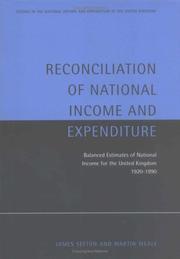| Listing 1 - 7 of 7 |
Sort by
|

ISBN: 0521496357 Year: 1995 Publisher: Cambridge Cambridge University Press
Abstract | Keywords | Export | Availability | Bookmark
 Loading...
Loading...Choose an application
- Reference Manager
- EndNote
- RefWorks (Direct export to RefWorks)
Consumption (Economics) --- National income --- 330.5 <410> --- 330.5 <410> Volksvermogen. Gemeenschappelijk produkt--?<410> --- Volksvermogen. Gemeenschappelijk produkt--?<410> --- Net national product --- Flow of funds --- Gross national product --- Income --- Consumer demand --- Consumer spending --- Consumerism --- Spending, Consumer --- Demand (Economic theory) --- Statistical methods --- United Kingdom
Book
Year: 1997 Publisher: Florence : European university institute,
Abstract | Keywords | Export | Availability | Bookmark
 Loading...
Loading...Choose an application
- Reference Manager
- EndNote
- RefWorks (Direct export to RefWorks)
Book
Year: 1967 Publisher: Baton Rouge Louisiana State University Press
Abstract | Keywords | Export | Availability | Bookmark
 Loading...
Loading...Choose an application
- Reference Manager
- EndNote
- RefWorks (Direct export to RefWorks)
Book
Year: 1997 Publisher: San Domenico (FI) : European university institute,
Abstract | Keywords | Export | Availability | Bookmark
 Loading...
Loading...Choose an application
- Reference Manager
- EndNote
- RefWorks (Direct export to RefWorks)
Book
Year: 1980 Publisher: Boston, Toronto Little, Brown and Co.
Abstract | Keywords | Export | Availability | Bookmark
 Loading...
Loading...Choose an application
- Reference Manager
- EndNote
- RefWorks (Direct export to RefWorks)
Book
Year: 1993 Publisher: London National Institute of Economic and Social Research
Abstract | Keywords | Export | Availability | Bookmark
 Loading...
Loading...Choose an application
- Reference Manager
- EndNote
- RefWorks (Direct export to RefWorks)
Book
Year: 1999 Publisher: Cambridge, Mass. National Bureau of Economic Research
Abstract | Keywords | Export | Availability | Bookmark
 Loading...
Loading...Choose an application
- Reference Manager
- EndNote
- RefWorks (Direct export to RefWorks)
This paper develops, calibrates, and simulates a dynamic 88-period OLG model to study the intergenerational transmission of U.S. wealth inequality via bequests. The model features marriage, realistic fertility patterns, random death, assortative mating based on skills, heterogeneous skill endowments, heterogeneous rates of return, skill inheritability, progressive income taxation, and resource annuitization via social security. All bequests arise from imperfect annuitization. Nonetheless, the model generates a realistic ration of aggregate wealth to aggregate labor income, a realistic bequest flow relative to the stock of wealth, and a realistic wealth distribution at retirement. Skill differences, assortative mating, social security, and the time preference are the primary determinants of wealth inequality. Bequests do propagate wealth inequality, but only in the presence of social security, which disproportionately disinherits the lifetime poor. Intergenerational wealth immobility, also considered here, is primarily determined by the inheritance of skills from one's parents and the magnification of the impact of this inheritance by marital sorting.
| Listing 1 - 7 of 7 |
Sort by
|

 Search
Search Feedback
Feedback About UniCat
About UniCat  Help
Help News
News